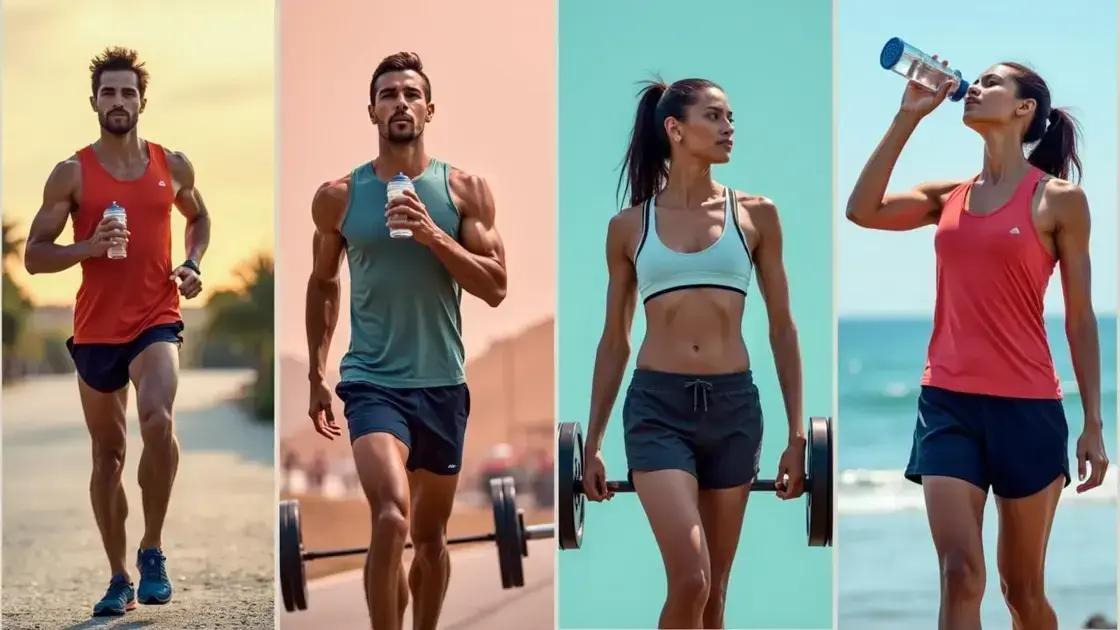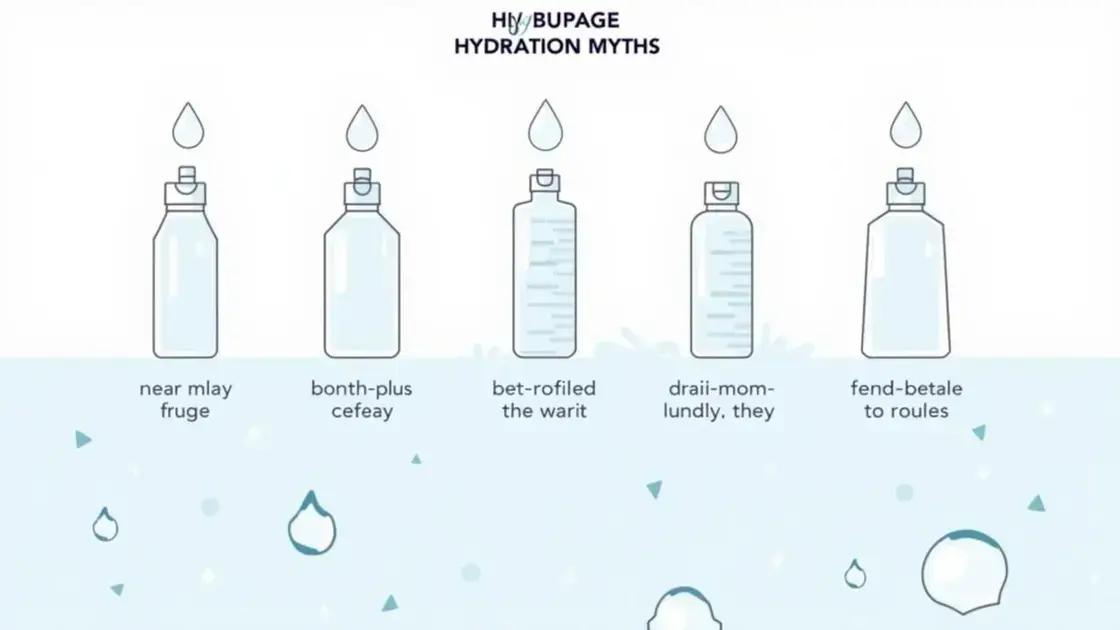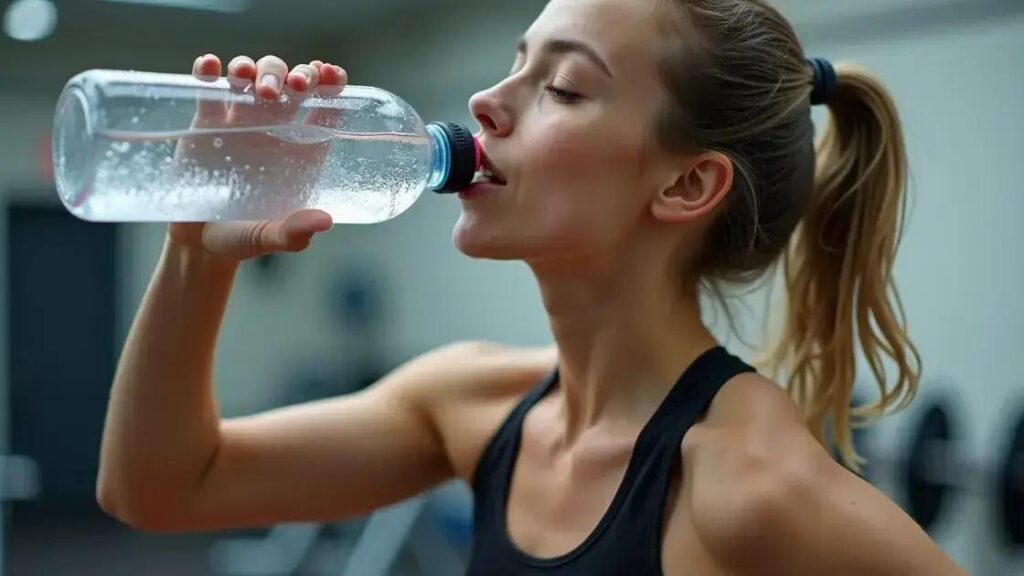Staying hydrated during exercise is essential for performance and health. Drink water regularly, recognize signs of dehydration, and tailor your hydration practices to the type of workout you’re doing, whether it’s endurance, strength training, or high-intensity sessions.
Staying hydrated during exercise is crucial for maintaining peak performance and overall health. Whether you’re hitting the gym or going for a run, proper hydration helps regulate body temperature, keeps joints lubricated, and prevents fatigue. In this post, we will highlight the best tips for staying hydrated during exercise, outline the signs of dehydration, and debunk common hydration myths.
The Importance of Hydration during Exercise

Staying hydrated during exercise plays a vital role in enhancing overall performance and well-being. When we engage in physical activities, our bodies lose fluids through sweating. If we don’t replenish these fluids, it can lead to decreased performance and increase the risk of heat-related illnesses.
Why Hydration Matters
Imagine running a race without water; your body would quickly tire out. Hydration helps to maintain energy levels. Water is crucial for regulating body temperature and lubricating joints, allowing for smoother movements during workouts.
Effects of Dehydration
When you don’t drink enough water, dehydration can occur, causing symptoms like fatigue, dizziness, and even confusion. As a result, your endurance and strength may also suffer. Dehydration can even lead to serious conditions like heat exhaustion, especially during hot weather.
Maintaining Balance
Drinking enough water can optimize your performance and support recovery. Aim for at least 16 to 24 ounces of fluid during each hour of intense workout. For long sessions, consider adding electrolytes to replace lost minerals.
Hydration and Recovery
Proper hydration is not just essential during workouts but also helps with recovery post-exercise. Recovery hydration prevents muscle cramps and promotes faster healing. Adding fruits and vegetables to your diet, which contain high water content, can also aid in replenishment.
Signs of Dehydration to Look Out For

Recognizing the signs of dehydration during exercise is crucial for maintaining your health and performance. Here are key symptoms to look out for:
1. Thirst
A strong feeling of thirst is your body’s first way of telling you it needs water. If you feel thirsty, your body is already signaling that it is becoming dehydrated.
2. Dark Urine
Dark yellow or amber urine is a clear indication that you are not drinking enough fluids. Well-hydrated individuals will have light yellow or clear urine.
3. Fatigue and Weakness
If you start to feel unusually tired or weak during your workout, it might be a sign of dehydration. Water helps to maintain your energy levels, so being low on fluids can drain your stamina.
4. Dizziness and Headaches
Experiencing dizziness or headaches can also signal dehydration. Inadequate fluids disrupt the balance of salts in your body, leading to these symptoms.
5. Muscle Cramps
Muscle cramping during exercise can occur if you’re dehydrated. Water is essential for proper muscle function, so be sure to stay hydrated to prevent these painful cramps.
Staying alert to these warning signs can help you avoid serious health issues and enhance your exercise experience.
Best Hydration Practices for Different Workouts

Hydration needs can vary based on the type of workout you are doing. It is important to tailor your hydration practices to maximize performance and recovery. Here are some best hydration practices for different workouts:
1. Endurance Training
If you are running, cycling, or participating in any endurance training lasting more than an hour, aim to drink water or sports drinks that contain electrolytes. Try to hydrate before your workout, sipping on about 16-24 ounces of water about an hour beforehand. During your activity, drink every 15-20 minutes to keep energy levels up.
2. High-Intensity Interval Training (HIIT)
For HIIT workouts, which are intense but shorter in duration, hydration before and after is key. Drink about 8-10 ounces of water before starting and replenish with the same amount afterward. You may not need to hydrate during the workout unless it’s particularly strenuous.
3. Strength Training
When lifting weights, your body loses fluids through sweat. Drink water before your session and take frequent sips during workouts. Target at least 7-10 ounces every 15 minutes to help maintain performance and support muscle function.
4. Yoga and Pilates
Even though these workouts may not seem as intense, they can still dehydrate you, especially in hotter settings. Drink water before you start, and keep a bottle nearby for sips during breaks. Focus on hydration after the session to aid recovery.
5. Sports Activities
If you’re playing team sports, such as basketball or soccer, hydrate before the game. Drink water or a sports drink every quarter or half to remain energized. Post-game, be sure to replenish fluids lost during play.
Hydration Myths: What You Need to Know

Understanding hydration is essential, but several myths can cloud the truth. Here are common hydration myths and what you need to know:
1. You Only Need Water When Thirsty
Many believe that thirst is an adequate indicator of hydration needs. However, by the time you feel thirsty, you may already be dehydrated. It’s crucial to drink water regularly, even when you don’t feel thirsty.
2. All Thirst Quenchers Are Equal
Some people think that sugary beverages or coffee can replace water. While they can provide hydration, they may also contain caffeine, sugar, or other ingredients that can dehydrate you in excess. Water is still the best choice for hydration.
3. Sports Drinks Are Necessary for Every Workout
There is a misconception that sports drinks are essential for all forms of exercise. Most light to moderate workouts don’t require these drinks, as water is sufficient. Reserve sports drinks for high-intensity or prolonged exercises lasting over an hour.
4. Drinking More Water Is Always Better
Overhydration, or drinking too much water, can lead to a dangerous condition called hyponatremia, where salt levels in the blood become too low. It’s essential to drink an appropriate amount based on your activity level and environment.
5. Once You’re Hydrated, You Stay Hydrated
Being well-hydrated doesn’t mean you’re set for the long term. Hydration is an ongoing process. Consistently drink water throughout the day, especially before, during, and after exercise, to maintain hydration levels.
Stay Hydrated for Optimal Performance
In conclusion, hydration is a crucial factor for maintaining peak performance during exercise. By understanding the importance of hydration, recognizing the signs of dehydration, and implementing best practices for different workouts, you can ensure that your body functions at its best.
Additionally, it is essential to dispel common hydration myths that may misguide your habits. Regularly drinking water and knowing when to opt for sports drinks based on your activity duration and intensity will greatly enhance your workout experience.
Ultimately, staying hydrated not only supports your physical performance but also contributes to overall health and well-being. Make hydration a priority to maximize your potential with every workout.
FAQ – Frequently Asked Questions about Staying Hydrated During Exercise
Why is hydration important during exercise?
Hydration is crucial for maintaining peak physical performance, regulating body temperature, and preventing fatigue or dehydration.
How much water should I drink before exercising?
Aim to drink about 16-24 ounces of water one hour before exercising to ensure proper hydration.
What are the signs of dehydration I should watch for?
Signs of dehydration include strong thirst, dark urine, fatigue, dizziness, and muscle cramps.
Do I need sports drinks for every workout?
Most light workouts require only water. Reserve sports drinks for high-intensity or prolonged exercises lasting over an hour.
Can I rely on thirst as an indicator of hydration?
No, by the time you feel thirsty, your body may already be dehydrated. It’s essential to drink water regularly throughout the day.
What are some common hydration myths?
Common myths include believing all beverages hydrate equally, that you can hydrate only when thirsty, and that drinking excessive water is always beneficial.













